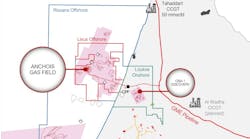Six key areas of skill and expertise emphasized
Brian Nixon
Scottish Enterprise
Scotland's energy industry is increasingly looking toward global markets to exploit new commercial opportunities. The North Sea oil and gas industry has been a significant driver in the Scottish and UK economies for the past 30 years. This province has now reached what is probably the half-way point in its life span and is undergoing a period of change as majors dispose of assets and the independents move in to tap maturing fields and explore new reserves.
An estimated £205 billion has been invested in the offshore industry since 1965. There are around 2,000 companies, ranging from SMEs to multi-nationals, active in the Scottish energy sector. More than 260,000 jobs in the UK are directly linked to this industry.
The North Sea, with reserves estimated at 24-32 Bboe, remains a key market for Scottish companies. The level of interest in the government's 21st licensing round indicates that E&P activity is set to increase. A recent survey revealed that 84 new field developments were planned, with a further 144 projects in mature fields. There can be little doubt that the North Sea and UKCS will remain an important market for Scotland, even before considering the new opportunities created by decommissioning work.
Long term prosperity, however, will require more and deeper internationalization within Scotland's energy sector. Many companies have already taken this route and are active in the major oil and gas producing regions.
Scottish companies are drawing on six key areas of skills and expertise in their push into new markets: production facilities; drilling technology and downhole tools; subsea engineering; training, competency and education; safety, health and environment; and renewables. Their track record of collaboration, adaptability and technological innovation over the past three decades is supporting this work.
The optimization of production asset performance in the North Sea has seen the development of innovative technology and contracting methods now being applied to other markets. Obtaining best value and reducing costs are areas where Scottish companies have excelled in developing brownfield engineering skills. The knowledge of FPSOs in the North Sea is now also being applied in regions like Equatorial Guinea.
Drilling and downhole services and products from the domestic province are also being rolled out to international markets, including slim hole MWD and LWD tools, compact turbo drilling, and advanced well completion technology.
Innovation has been central to the success of the 40 independent companies now represented in the Scottish Subsea Technology Group that are involved in product development and manufacture, design and engineering, equipment rental, and consultancy. The group's members, supported by Scottish Enterprise, employ more than 2,000 people with experience in the complete lifecycle of subsea assets. It provides the option of a one-stop shop to clients through an individual or collective approach to problem solving.
Competency assurance and skills development are growth areas in international markets, and Scotland's specialist training providers and academic institutions are well placed to offer solutions. This includes skills such as offshore survival and firefighting to undergraduate and postgraduate development at our 13 universities. The strong links between academia and business in Scotland are contributing to the commercialization of new technology as well as supplying companies with highly qualified personnel. Collectively the industry has also worked to introduce benchmark standards and systems such as the pan-industry Vantage Passport.
The North Sea has seen continuous improvement over the past 30 years in safety and environmental standards. Specialist companies have developed skills covering consultancy, management, and engineering, both onshore and offshore. These safety and environmental management systems are now finding applications in overseas markets.
The cross fertilization of skills and knowledge that has typified our oil and gas industry is opening up new opportunities in alternative energy sources. The renewables sector is important both on a domestic level and internationally. Scottish companies are exploiting engineering and research skills to develop their market share in wind and tidal stream power and in fuel cell technology.
The provision of market intelligence and business consultancy services is enabling smaller companies to explore new international opportunities in oil and gas and implement commercial strategies focused on sustainable growth.
Brian Nixon is director of energy with Scottish Enterprise, Scotland's main economic development agency.


